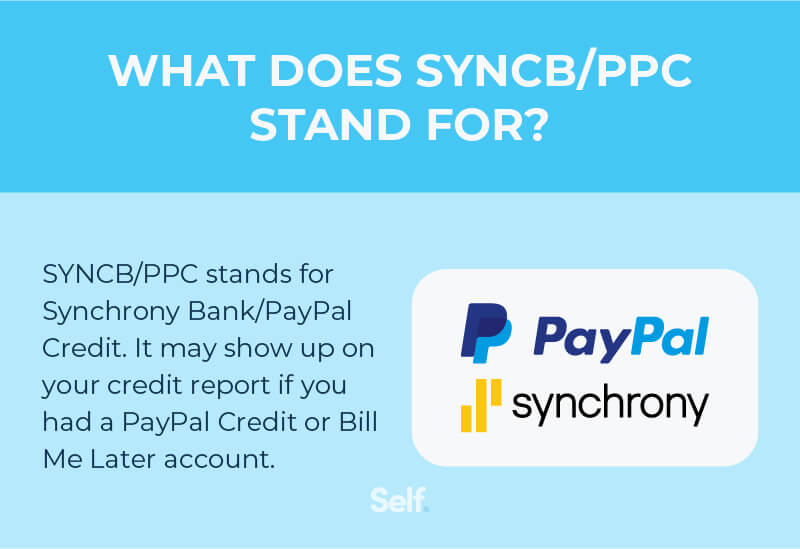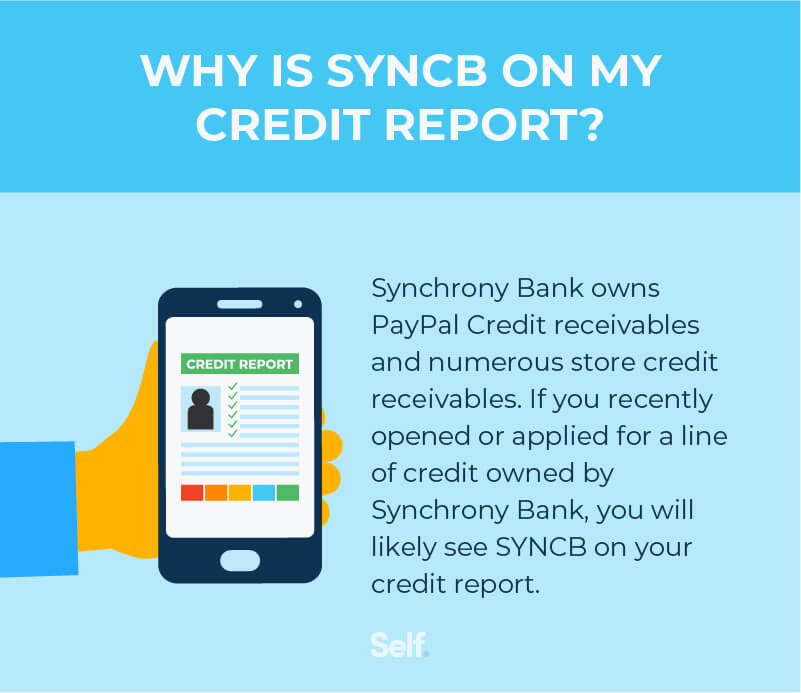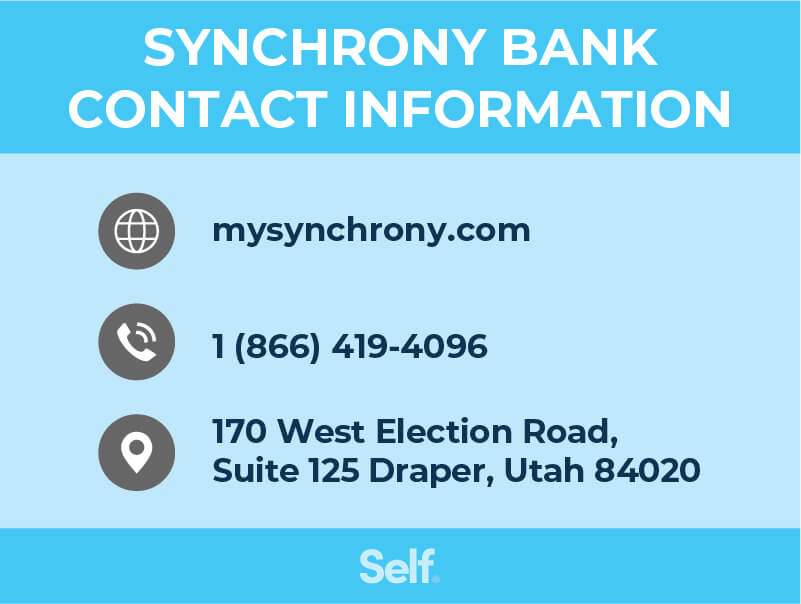What Is SYNCB/PPC and Why Is It on Your Credit Report?
Published on: 01/10/2022
If you see SYNCB/PPC on your credit report, you might be concerned. However, if you ever applied for a PayPal line of credit or had a Bill Me Later account, there’s no reason to be worried.
What does SYNCB/PPC stand for?
SYNCB stands for Synchrony Bank and PPC stands for PayPal Credit.
In 2018, Synchrony Financial purchased billions of dollars worth of PayPal’s accounts receivable, including Bill Me Later accounts. The two companies formed an initial partnership in 2004 to offer credit card options to PayPal users under the PayPal Holdings brand.[1] PayPal credit is offered through Synchrony and is subject to the bank’s approval.[2]

What is SYNCB?
Synchrony Bank is a financial services company that was founded in 1932. It’s an issuer of credit cards for a diverse group of companies. In fact, it offers more than 100 credit card options to consumers through its partners. These include Chevron, Banana Republic, PayPal, eBay, and Sam’s Club.[3] Here are just some of the 116 companies that offer credit through Synchrony, which means you might see the SYNCB acronym associated with them on your credit report.
- Athleta Store Card
- JCPenney
- Gap Store Card
- Stein Mart
- Ashley Furniture Home Store
- Amazon Store Card
- Lowe’s Store Card
- Sam’s Club Store Card
- Walmart Store Card

Why is SYNCB/PPC on my credit report?
If SYNCB/PPC is on your credit report, you may have an active or closed PayPal Credit account, or you may have applied for credit through PayPal at some point.
Old PayPal Credit accounts may show up on your credit report even though they haven’t been there before. This is because PayPal Holdings may not have reported account activity to the credit bureaus, but Synchrony Bank is doing so.
You have an active or closed PayPal Credit account
You might expect an active account to appear on your credit history, but you may not realize that closed accounts appear there too, and stay there for up to 10 years.
Even if you didn’t close the account yourself, the lender may have closed it due to inactivity or inability to make payments. Information on both active and closed accounts is passed on to the three major credit reporting agencies — Equifax, Experian and TransUnion — and can stay there for years.
You applied for a PayPal Credit account
SYNCB/PPC can show up as a hard inquiry, which is generated whenever you apply for a new account. If you applied for a line of credit through PayPal Credit or its predecessor, Bill Me Later, you’ll see those letters appear on your credit report.
Whenever you apply for credit, from PayPal or anyone else, it generates a “hard inquiry.” This means that the company you’ve applied with is checking your credit record to determine whether they should lend to you. This kind of credit inquiry, also called a “hard pull,” can remain on your credit report for two years.
A hard inquiry can also appear if you’ve applied for a credit increase on a card you already have.
If you’ve applied for new credit from PayPal, it will likely cost you a few points on your credit score. (By contrast, a “soft inquiry,” in which someone such as a prospective employer checks your credit with your permission, doesn’t affect your credit score — even though it will remain on your credit history for two years. This is because you’re not seeking new credit.)
There’s nothing you can do to remove a hard inquiry from your credit report if you did, in fact, apply for credit. But if you didn’t, and the information is inaccurate, there are steps you can take to have it removed.
Can I remove SYNCB/PPC from my credit report?
Credit bureaus aren’t perfect, and errors on your credit reports do happen — more often than you might expect.[4] But you can catch them by ordering a free credit report (it’s your right to do so under the law) at annualcreditreport.com. You can also do a free credit score check, but keep in mind that your credit score and your credit report are two different things.
Some of the most troublesome inaccuracies on a credit report stem from identity theft or fraud. If someone else applied for PayPal Credit using your personal information, that “hard pull” will show up on your credit report.
How to remove inaccurate hard inquiries from your credit reports
If SYNCB/PPC has shown up on your credit report and you’ve never applied for PayPal Credit, you can dispute the item by contacting the credit bureaus online, by phone or by mail.
Be sure to specifically identify the unauthorized inquiries you want removed and provide any supporting documents you have to make your case. In the case of fraud, you may want to have a police report or Federal Trade Commission identity theft report on hand, as well as any correspondence from PayPal itself that affirms your claim.
You should also contact the credit card company directly and ask them if they know who applied for credit with your information. Make sure to document the conversation and request a transcript for when you submit a dispute to the credit bureaus.
If you’re not comfortable disputing the inquiry yourself, you can pay a credit repair company to address the situation for you, but keep in mind that they won’t be able to remove anything that is accurate from your credit report. In fact, anything they can do, you can do for free if you know how and are willing to take the time.
How to remove faulty credit accounts from your credit reports
If your credit report shows that you’ve got an active or closed PayPal Credit account, even though you never had such an account, contact Synchrony Bank to see if they can help you resolve the matter.
It’s important to do so because false information can affect your credit score, which in turn impacts your eligibility for loans and your interest rates.
How to contact Synchrony Bank
If you find an error or suspect fraud on your credit report associated with PayPal or another account managed by Synchrony Bank, you can contact Synchrony online at www.synchronybank.com/contact-us, or find answers to FAQs and chat with an online representative at www.mysynchrony.com/faqs.html.

How does an SYNCB/PPC inquiry impact my credit score?
As mentioned earlier, a hard inquiry based on a credit application with PayPal (or any other financial institution) stays on your credit report for two years. If you have just a few credit accounts and a relatively short credit history, it could hurt your credit score more than it would if you have a long credit history and a larger number of accounts.
Final thoughts
If the symbol SYNCB/PPC appears on your credit report, it means one of four things: You’ve applied for PayPal Credit, you have an active or inactive PayPal Credit account, someone has committed fraud using your name, or there’s been an error on your credit report.
What action you can take depends on why the reference is there. Understanding how credit reports work and knowing your options is a good step toward staying on top of the situation and effectively monitoring your personal finances.
Sources
- Business Wire. “PayPal and Synchrony Complete Consumer Credit Receivables Sale,” https://www.businesswire.com/news/home/20180703005221/en/PayPal-Synchrony-Complete-Consumer-Credit-Receivables-Sale. Accessed September 15, 2021.
- PayPal. “PayPal Credit Basics,” https://www.paypal.com/us/webapps/mpp/paypal-credit/faq. Accessed September 15, 2021.
- Upgraded Points. “Full List of 116 Synchrony Store Credit Cards [Includes the Best Cards],” https://upgradedpoints.com/credit-cards/synchrony-bank-store-credit-cards. Accessed September 15, 2021.
- Consumer Reports. “More Than a Third of Volunteers in a Consumer Reports Study Found Errors in Their Credit Reports,” https://www.consumerreports.org/credit-scores-reports/consumers-found-errors-in-their-credit-reports-a6996937910. Accessed September 14, 2021.
About the author
Lauren Bringle is an Accredited Financial Counselor® with Self Financial– a financial technology company with a mission to help people build credit and savings. See Lauren on Linkedin and Twitter.
